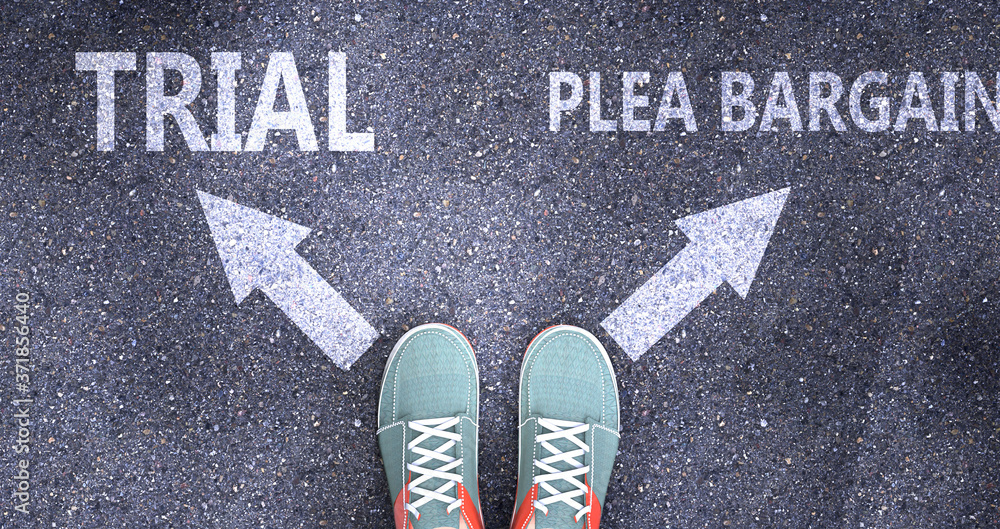A criminal trial is about to begin. The Judge, the jury, the Prosecution, the Defendant and the Defendant’s attorney are all present. However, before the Prosecution can open their case to the jury, the Prosecution and Defence Counsel advise the Court that they have reached a plea agreement.
A plea agreement is essentially an agreement between the Prosecution and Defence Counsel (if a Defendant is represented) with the approval of the Defendant in a criminal case. The Defendant agrees to plead guilty to the charged crime or a lesser crime, and the Prosecution agrees to provide the Defendant with a “benefit” for such agreement. While the Prosecution agrees to provide a “benefit”, it is merely a recommendation as it relates to the sentence which has to be put before the Judge and approved. As a part of the approval of such agreement, the Judge would question the Defendant as to whether he/she understood the terms of the agreement and whether the Defendant accepted the terms of the agreement voluntarily.
However, before agreeing to any of the terms of a plea agreement, a Defendant should weigh up the pros and cons. Accepting a plea agreement may be a good decision, for example, there may be a possibility of the Prosecution offering to reduce the original charge, which may carry a lesser sentence; it may save money that would have been spent on attorney fees and other costs had the matter gone to trial; and it may provide certainty as to the final outcome of the matter as a jury trial may produce an unwarranted or excessive result, and the ability to be released from jail if the agreement provided for probation as a sentence or being released from jail earlier than anticipated. As much as a Defendant may view these as potential “benefits” of accepting the terms of a plea agreement, there are also possible consequences that may arise. These include a Defendant’s assertion of his innocence where in the face of a possible lesser charge and a reduced sentence, he/she may find it difficult to accept such agreement; the possible loss of a Defendant’s rights such as the presumption of being innocent until proven guilty; having a criminal record for the rest of his/her life; and having to ultimately follow through with the sentence the Court gives to the Defendant.
Plea bargaining and plea agreements are concepts mostly seen on American TV shows. However, within the Caribbean jurisdiction, the Courts have readily identified the benefits to plea bargaining.
In “Plea Bargaining: A Fast Track To Justice”, Director of Public Prosecution (DPP) Paula Llewellyn, KC of Jamaica, outlines the process taken by the Prosecution when considering a plea agreement. It includes: firstly, looking at the facts of the case or the allegations and the gravity of such allegations; secondly, if the plea encompasses a lesser offence, ensuring that as a matter of law there is a clear outlined legal justification in accepting that plea; and thirdly, establishing whether the Defendant has assisted or is assisting the investigation or prosecution of any particular case. She goes on to say that the length of time a person waits to consider a plea agreement or negotiation can impact by how much their sentence can be reduced. In addition to these considerations, the victims of such crimes are also included in the plea bargaining process, and the Court is at liberty to consider any statements made by the victims regarding how the crime impacted them. There is legislation in Jamaica under the revised Plea Negotiations and Agreement Act (2017) that governs how plea bargaining should work, and it includes the criteria used by judges when deciding whether to accept a plea deal.
Jamaica is not the only country in the Caribbean that has legislation governing plea agreements or plea negotiations/bargaining. The Bahamas in 2008 enacted the Criminal Procedure (Plea Discussion and Plea Agreement) Act. The purpose of the Act is to provide for the establishment of a system of plea discussions and for other matters incidental thereto. The Act makes provisions for the Court to consider the views of the victims of such crimes, offers protection for unrepresented Defendants and creates parameters for prosecutors who are involved in plea negotiations.
Additionally, in St. Lucia the objective of the Early Guilty Plea Scheme, Practice Direction No. 1 of 2015, as found in the Eastern Caribbean Supreme Court Criminal Procedure Rules (only applicable to indictable offences in St. Lucia), is to identify cases where a Defendant is likely to plead guilty and expedite the case to the Early Guilty Plea Hearing so that sentencing can occur. Additionally, Defendants who utilize this scheme at an Early Guilty Plea Hearing qualify for the maximum sentence reduction. The scheme outlines the considerations to be taken by the Judge and makes provisions for the procedure adopted by the Court once a Defendant has indicated his/her intention to use the scheme.
Minister of Justice for Jamaica, Hon. Delroy Chuck, in “Plea Bargaining: A Fast Track To Justice” stated in response to the pros of plea bargaining: “It also saves the cost to the prosecution, the defence, everybody, which is quite significant. It reduces the backlog in the court system and, therefore, the more serious cases can be dealt with in a more calm and expedited manner. It obviously assists in showing that the accused person is remorseful and, therefore, is a major mitigating factor to ensure that the accused is given some consideration. He continued, “This is very useful for persons who know they are guilty and acknowledge their guilt, accept the sentence that is agreed on, because they may well go to trial and be acquitted, burden the court and at the end of the day, justice would not have been done.”

